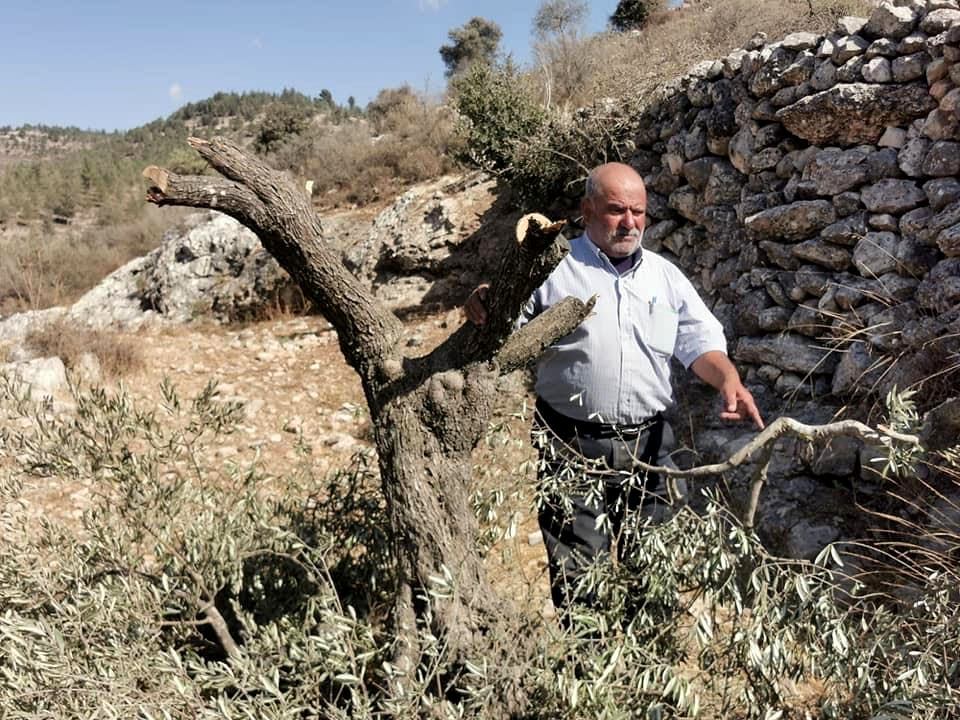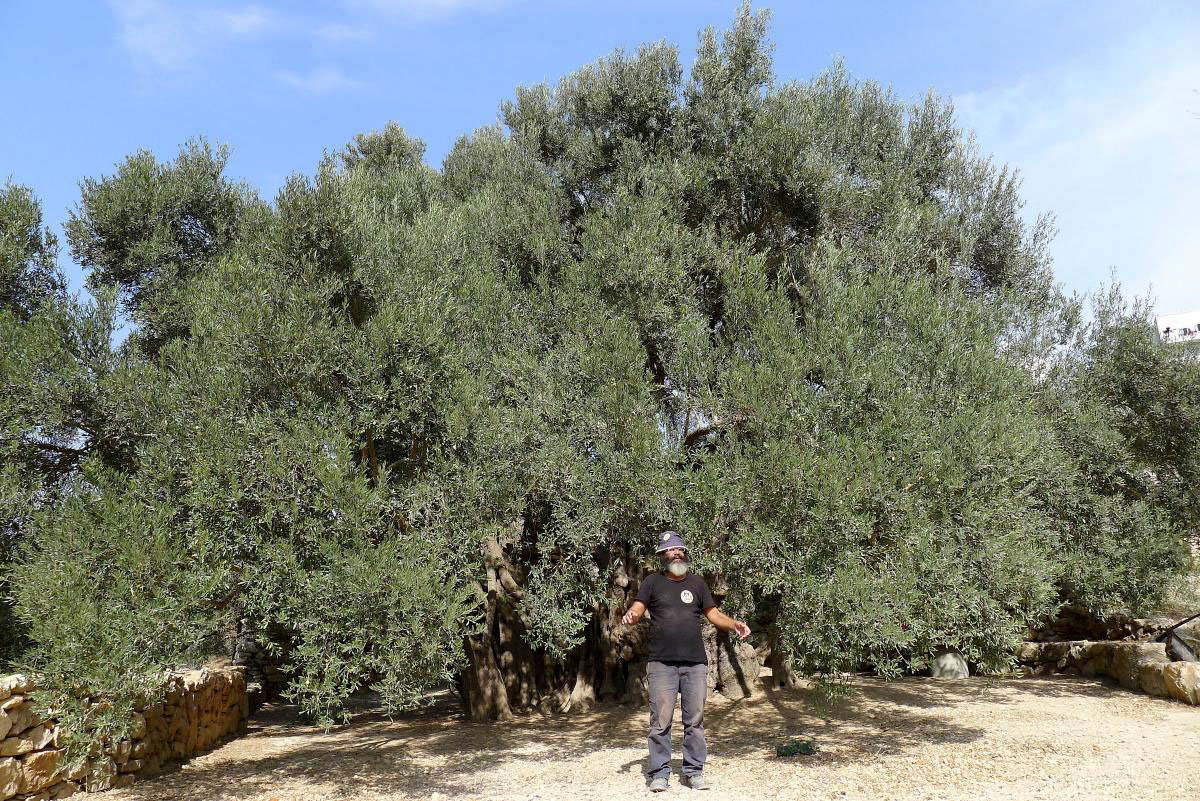Olive trees are majestic, they are the source of many livelihoods throughout Palestine, and they have too often been slashed and torched by Israeli settlers. Olive trees should never be pawns in a political supremacy game.
Basil al-Adraa
Olive trees in the occupied Palestinian territories are subjected to daily aggression by the Israeli occupation and settlers. They are vandalized, burned, cut and robbed of their love. For the Palestinians, the olive tree is a symbol of the land, and it reflects their historical presence on the land of Palestine.
Palestinians wait throughout the year to harvest their olives on the land they inherited from their ancestors, only to find their trees uprooted and burned by the Israeli settlers. One of the most terrible attacks was in 1986, when the Occupation forces and their bulldozers cut down more than 3,000 perennial (very old) olive trees in the West Bank and Occupied Jerusalem. The average age of those trees was two hundred years. For many, these trees symbolized Palestine and the Nakba.
During the summer of 2020, settlers from the settlement of Susiya uprooted and cut down 400 trees — an outrageous number from a field belonging to Barakat Mor, an older Palestinian man, living in Tawamin. Take a moment to understand the number. 400. 400 trees, gone.

I spoke to Barakat after this tragedy and he related, “Me and my family spent years taking care of 400 trees. Watering them, caring for them, living off of them. We had a wedding in Yatta city on August 13, 2020 that lasted two days. When we came back from the wedding we found that all of our trees were cut. It is an indescribable pain. But economically it is a blow I will not be able to recover from. At once, it is all gone. We will never be the same.” Barakat and his family lost their source of income. This is a sort of death.
The State of Israel prevents the development of Palestinian agriculture in Area C, where most of the agricultural potential is located in the West Bank. Over the years, Israel has confiscated hundreds of thousands of dunam from the Palestinians and turned the land into “state land,” land that is allocated exclusively to Jewish Israeli settlers. Palestinians on the other hand, are not allowed to plant on new land, dig wells, and build roads that provide them access to their villages. In addition to settler violence, these limitations force Palestinians to leave their agricultural lands.
In 2019, Abu Hani — an older Palestinian man who lives between two settler outposts — was issued a removal order by the Israeli Occupation Forces (IOF). Although he had documentation proving he owns the land, the Israeli forces claimed Abu Hani’s land, “state land.” This issue of removal included his home, a water well, and hundreds of trees. Since then the IOF demolished his home two times and uprooted 150 of his trees. In solidarity with Abu Hani, a few activists and I collected around 100 trees and planted them in his garden.
In the South Hebron Hills, and particularly in my village, settlers have cut down and burned hundreds of trees. They organize most of their attacks on the olive trees during the olive picking season where they attack the trees and the people who pick them. As a volunteer and an activist, I accompany Palestinians who harvest their fruits in the areas adjacent to Jewish settlements. In November 2019, a family was picking fruits between their village and the illegal outpost, Havat Ma’on, where the most extreme and violent settlers are located in the South Hebron Hills. On this sunny day I received a phone call from my neighbor who told me in a shaky voice that several settlers were throwing stones at him and his family. I ran straight to the field where they were picking olive trees with my camera and saw six settlers and a dog. When I started to film, one of the settlers unleashed his dog on me and it bit my hand. I felt a sharp pain and noticed my hand was bleeding. When the army arrived they refused to order an ambulance for me. I laid on the ground, bleeding, for almost forty minutes until a Palestinian ambulance arrived and took me to the hospital.
Two days later, when I left the hospital, I went straight to the Israeli police station which is located inside a nearby Jewish settlement. It is not easy for me to enter a settlement, but the injustice done to me was so painful that I felt I must go. As a Palestinian living under a foreign military occupation, this was the only way for me to demand justice.
Even though I filmed the entire incident and had the settlers faces recorded on my camera, the police officer taking my complaint turned the investigation against me. He asked me: What were you doing there? Why didn’t you run away? Why were you filming? Why are you bringing other activists to film and cause problems?
I managed to file my complaint in the end, after a nerve-wracking day. Unsurprisingly, an arrest was never made. The same settler has recently unleashed his dog on two other people from my town.
This is systematic. According to the Israeli human rights organization Yesh Din, since 2005, the Israeli police has closed 91% of Palestinian complaints against settler violence without pressing any charges against the perepetators. Not because a crime wasn’t committed, but because they “failed to investigate” it.
Data gathered by the International Committee of the Red Cross (ICRC) shows that between August of 2020 and August 2021, settlers burned, cut down or uprooted more than 9,300 olive trees in the West Bank. “For years, the ICRC has observed a seasonal peak in violence by Israeli settlers residing in certain settlements and outposts in the West Bank towards Palestinian farmers and their property in the period leading up to the olive harvest season, as well as during the harvest season itself in October and November,” said Els Debuf, head of the ICRC’s mission in Jerusalem. Previously, United Nations monitors documented that more than 4,000 olive trees and other tree crops had been burned or removed by Israeli settlers and forces in 2020.

Agricultural experts estimate Palestinian fields will produce around 12 thousand tons of pure olive oil. That is half the amount of oil that was produced last year and may lead to a sharp rise in prices. Now that the harvesting season is over, it is clear that the combination of climate change and the repeated attacks of settlers on Palestinian olive trees negatively affected the production of olive oil this year. Despite this, the Palestinians exercise their love for the land and their attachment to the olive trees, expressing the highest form of solidarity among them.
Politically, the destruction of olive trees is another mechanism by which Palestinians are being evicted from the areas labeled by Israel as Area C. How? During the day, the Israeli army demolishes Palestinian homes, pressuring us to leave this area. Then at night, settlers commit crimes such as tree burning or uprooting which further pressures people to leave. When you uproot someone’s tree, you try to uproot his or her presence in the land. You try to make them leave. This will not work. We will stay and live and love on this land, regardless of Israel’s efforts to uproot us from it. We need your solidarity to keep us on this land and help combat these crimes.



